Did you know a child’s brain grows the most during preschool? This is the best time for fun early learning activities. These activities help with thinking, social, and motor skills. We’ll share many fun and educational ideas to help your preschooler do great.
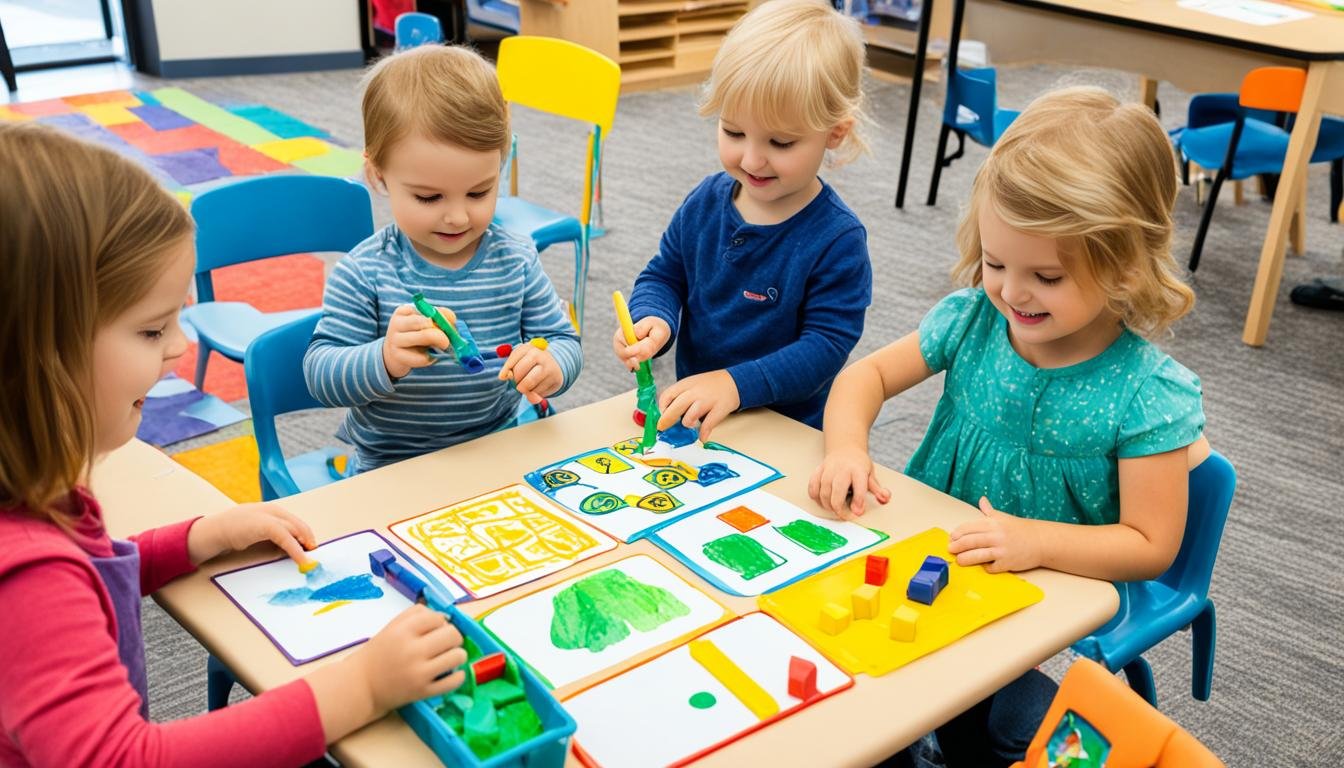
early learning activities
A group of preschoolers engaged in hands-on learning activities, such as building blocks and drawing with markers.
These activities include hands-on sensory play and games that focus on reading and writing. They keep your child interested and ready for kindergarten. This article is full of great tips for parents, caregivers, or early childhood teachers. It helps support your child’s growth and learning.
Key Takeaways
- Early learning activities are key for preschoolers’ growth in thinking, social, and motor skills.
- Doing different activities helps kids get ready for kindergarten.
- Activities like sensory play and games help reach important milestones.
- Using Montessori methods and STEM ideas helps with all-around learning.
- A great learning space at home or school makes early learning better.
Fostering Early Literacy Skills
Early literacy skills are key for preschoolers. Reading aloud and storytelling are two important parts of this. They help kids learn and grow.
Reading Aloud and Storytelling
Reading to kids introduces them to new words and language patterns. It also makes them love books and reading. Storytelling boosts their imagination, listening skills, and understanding of stories.
- Reading to kids for 15-20 minutes daily boosts their literacy skills.
- Storytelling activities like acting out stories help kids with language and thinking.
Letter Recognition and Phonics Games
Reading and storytelling go hand in hand with letter recognition and phonics games. These activities teach kids about letters and sounds. This is the base for reading and writing well.
| Activity | Description | Benefits |
|---|---|---|
| Letter Matching | Children match uppercase and lowercase letters. | Improves letter recognition and understanding of letter-sound correspondence. |
| Phonics Bingo | Children identify and mark words that start with a specific sound. | Enhances phonemic awareness and phonics skills. |
| Alphabet Scavenger Hunt | Children search for objects or images that start with a particular letter. | Develops letter-sound association and early reading skills. |
Adding these fun activities to your child’s daily routine helps their literacy skills. It prepares them for school and success.
Hands-On Sensory Play Ideas
Sensory play is key for young children’s learning and growth. It lets them use their senses to explore the world. This helps them develop important skills like fine motor coordination and problem-solving.
This section offers fun activities that make learning through the senses exciting. Kids get to explore different textures and materials, which helps them learn in a hands-on way.
Exploring Textures and Materials
Touching and feeling various textures is a big part of sensory play. Create a sensory bin with things like sand, water beads, dried pasta, or shredded paper. Kids can use their hands to explore and learn about these materials.
A touch-and-feel box is another great idea. Kids can reach in and guess what they’re touching by its feel and shape. This game helps with fine motor skills and talking about what they find.
- Explore materials like play dough, kinetic sand, and shaving cream.
- Make a “feely bag” with different objects for kids to find by touch.
- Add natural things like pinecones, seashells, or smooth rocks to sensory activities.
These hands-on activities make learning fun and engaging. They help kids develop skills that are important for life. By enjoying sensory play, they learn in a way that’s fun and effective.
Developing Fine Motor Skills
Preschoolers need to work on their fine motor skills for things like writing, cutting, and handling small items. This section shares fun and learning exercises to help young kids get better at these important skills.
Scissor Practice and Lacing Activities
Learning to use scissors is a big deal for preschoolers. Give them different cutting activities, like cutting paper or shapes from Play-Doh. Tasks like lacing cards or beading also help with hand-eye coordination and dexterity.
Clay Modeling and Playdough Creations
Working with clay or playdough is great for kids to improve their fine motor skills. Encourage them to shape, roll, and mold the materials into fun shapes. These Montessori-inspired activities boost creativity and strengthen their small muscles.
| Fine Motor Skill Activity | Benefits |
|---|---|
| Scissor Practice | Develops hand-eye coordination and dexterity |
| Lacing and Threading | Improves fine motor skills and hand-eye coordination |
| Clay Modeling | Strengthens small muscle control and creativity |
| Playdough Creations | Enhances fine motor skills and imagination |
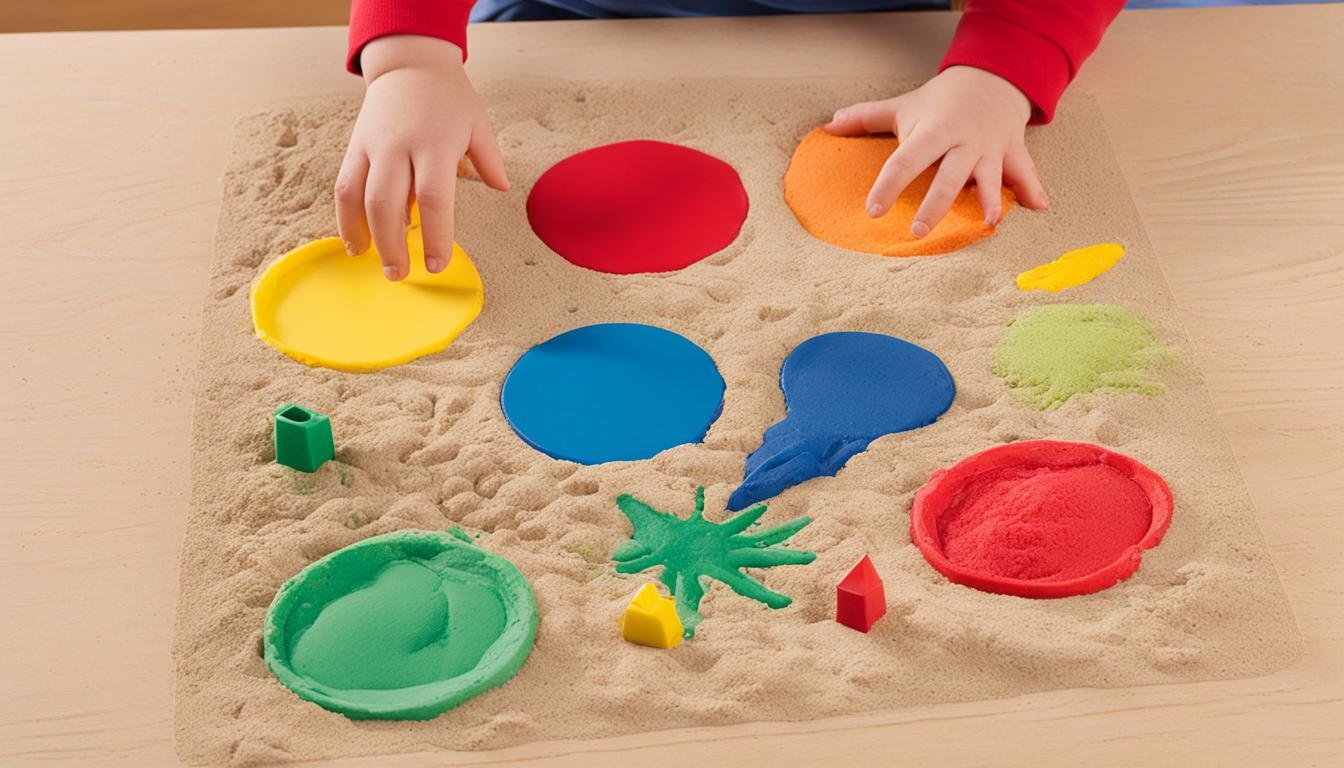
early learning activities
“Engaging in hands-on fine motor activities helps preschoolers develop the dexterity and control they need for complex tasks like writing and self-care.”
Nurturing Cognitive Development
Cognitive development is key in early childhood education. Activities that engage young preschoolers help build important skills like problem-solving, memory, and critical thinking. Through learning through play, kids can have fun while developing their minds.
Hands-on early learning activities are great for cognitive development. Puzzles, block building, sorting games, and simple science experiments are examples. These activities make kids think creatively and make logical connections.
Reading aloud and storytelling are also vital for cognitive development. They help kids learn new words, improve listening, and spark their imagination.
| Activity | Cognitive Skills Developed |
|---|---|
| Puzzles | Problem-solving, spatial awareness, logical thinking |
| Block Building | Creativity, problem-solving, mathematical reasoning |
| Sorting and Matching Games | Classification, pattern recognition, memory |
| Science Experiments | Curiosity, hypothesis testing, observation skills |
Using a mix of early learning activities helps preschoolers grow their cognitive skills. This prepares them for their school journey.
Encouraging Language Acquisition
Helping preschoolers develop strong language acquisition skills is key. Singing songs and reciting nursery rhymes is a fun way to do this. These activities not only capture young minds but also build a strong base for early literacy skills and growing vocabulary.
Singing Songs and Nursery Rhymes
Singing with preschoolers introduces new words and helps them understand simple sentences. It also makes their pronunciation better. These activities repeat language patterns, helping kids get the speech rhythm. Plus, singing makes remembering words easier, which is good for language growth later on.
- Engage children in lively renditions of classic nursery rhymes like “Twinkle, Twinkle, Little Star” and “The Itsy Bitsy Spider”.
- Encourage them to join in as you sing simple, repetitive songs like “The Wheels on the Bus” and “Old MacDonald Had a Farm”.
- Introduce new songs and rhymes that feature colourful imagery and diverse vocabulary to expand their linguistic repertoire.
Adding singing and nursery rhymes to your preschool plan can make kids love language. It also prepares them for more early learning activities that help with language acquisition.
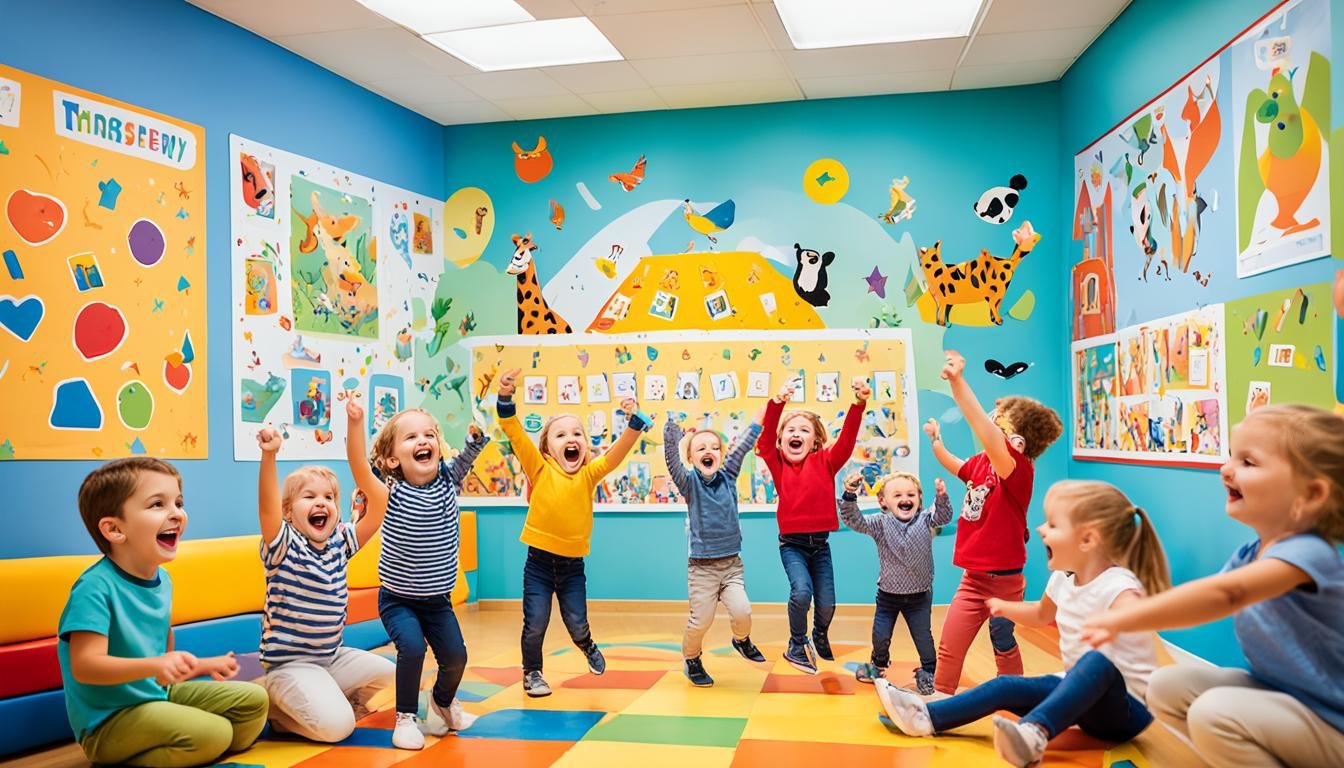
early learning activities
Early Learning Activities: Montessori-Inspired Activities
The Montessori method focuses on hands-on learning. It helps preschoolers become independent and improve their fine motor skills. These activities focus on practical life skills and self-care.
Practical Life Skills and Self-Care
Montessori activities teach young children important skills like pouring, scooping, threading, and buttoning. These activities improve fine motor skills and teach self-care. They also make children feel proud of their achievements.
Activities like hand-washing, tooth-brushing, and dressing themselves help children learn practical life skills. They become more independent.
The “Practical Life” area is a favourite spot for kids. It lets them practice real-life tasks safely and with fun. They can set up a mini kitchen or a dressing station. This helps them learn to prepare snacks, pour liquids, and dress themselves.
“The greatest sign of success for a teacher… is to be able to say, ‘The children are now working as if I did not exist.'”
– Maria Montessori
Adding Montessori-inspired activities to early learning helps kids feel independent. It boosts their fine motor skills and self-care abilities. This sets a strong base for future learning and growth.
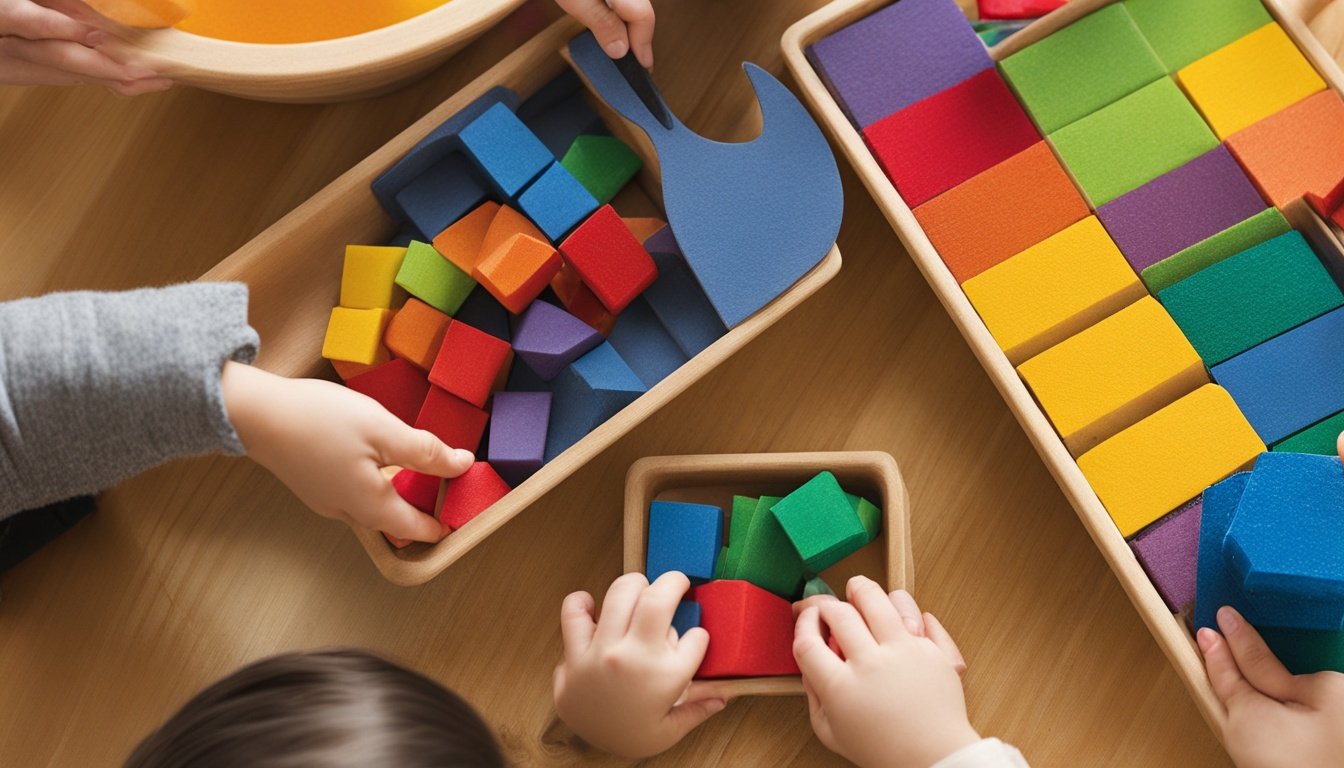
early learning activities
Promoting Social and Emotional Growth
Preschoolers start their learning journey early. It’s key to help them grow socially and emotionally, not just in academics. Using cooperative games and role-playing helps build important skills like teamwork, empathy, and managing feelings.
Cooperative Games and Role-playing
Cooperative games teach young learners to work as a team towards a goal. They learn about teamwork and how to talk to each other. Activities like group puzzles and musical chairs help them share, negotiate, and celebrate together.
Role-playing lets kids try out different roles and feelings. It helps them understand others and deal with social situations safely. This way, they grow emotionally and socially.
- Group problem-solving challenges that require teamwork
- Imaginative play with dress-up and puppets to act out real-life scenarios
- Turn-taking games that promote patience and self-regulation

early learning activities
These activities do more than just help with social and emotional growth. They also boost critical thinking, language skills, and confidence. By making a caring and welcoming space, teachers help preschoolers get ready for good social skills and emotional health.
Incorporating STEM Concepts
Starting early with STEM (Science, Technology, Engineering, and Mathematics) can lead to great success later on. Simple science experiments and fun counting and patterning activities help preschoolers grow their curiosity. They also build important skills for math and learning early on.
Simple Science Experiments
Preschoolers love to explore and learn. By using simple science experiments, we can spark their interest in STEM. Activities like watching a butterfly grow or learning about light and colour help them think critically and solve problems.
Counting and Patterning Activities
Learning numbers and patterns is key for preschoolers. Fun activities like building with LEGO or Duplo, sorting beads, or finding shapes around them, make math exciting. These activities are great for building math skills in a fun way.
Adding STEM activities to preschool helps kids love science, technology, engineering, and mathematics. This sets them up for success in school and life.
Outdoor Play and Nature Exploration
Exploring the outdoors can change young learners for the better. Outdoor play and nature exploration let preschoolers enjoy sensory play, improve their physical skills, and connect with nature deeply.
Walking through green forests or playing in streams, these early learning activities spark kids’ curiosity. They learn to use all their senses to explore. They might touch tree bark, smell wildflowers, or listen to birds sing. These activities make kids wonder and appreciate nature more.
- Observe the changing seasons and discuss the natural cycles of growth and renewal.
- Encourage hands-on exploration of leaves, rocks, and other natural materials.
- Create nature-inspired art projects using found objects and natural materials.
- Engage in imaginative play, such as building forts or shelters in the woods.
- Go on a scavenger hunt to discover different plants, insects, and animal habitats.
Adding outdoor play and nature exploration to preschool helps kids love learning. It boosts physical activity and supports their growth in all areas.
| Benefits of Outdoor Play and Nature Exploration | Examples of Activities |
|---|---|
|
|
“When children have the freedom to explore nature, they develop a stronger sense of self, a better understanding of the world around them, and a deeper appreciation for the beauty and wonder of the natural environment.”
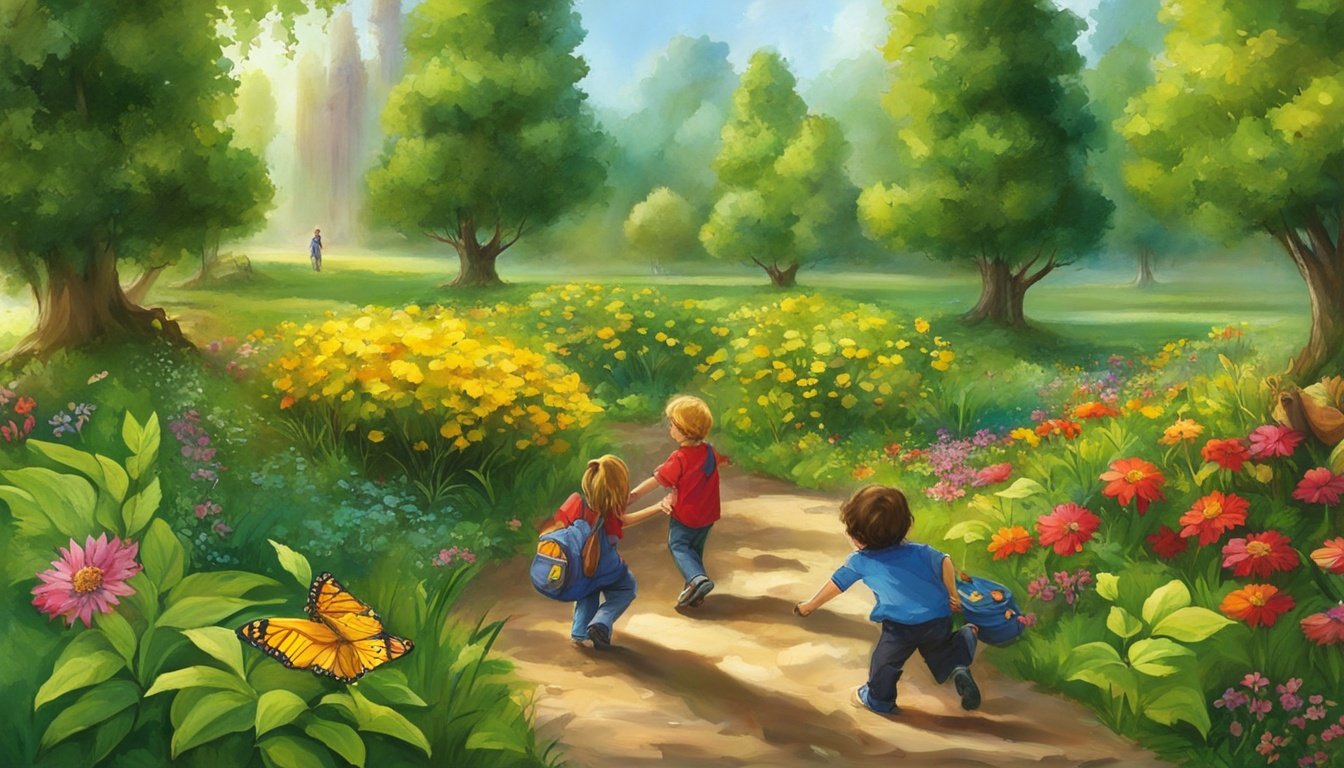
early learning activities
Celebrating Creativity and Self-Expression
Encouraging creativity and self-expression in preschoolers is key to their early learning. Open-ended art projects let them explore their imagination and be themselves. This boosts their confidence and makes learning fun.
Unleashing Artistic Exploration
Art projects without strict rules let preschoolers think creatively. By offering materials like paints, crayons, clay, and recycled items, you spark creativity and self-expression. Watch as they play with colours, textures, and shapes, showing their unique views through their art projects.
- Offer a variety of art mediums to encourage exploration
- Avoid providing step-by-step instructions, allowing children to guide their creations
- Celebrate the process of creating, rather than focusing on the final product
In early learning activities, it’s key to create a safe space for kids to be creative and express themselves. This helps them grow and develop important skills for the future.
Early Learning Activities: Educational Toys and Resources
Supporting early learning with educational toys and resources is key. These tools help with cognitive, physical, and social-emotional growth through play.
There are many educational toys like wooden puzzles and coding robots. These toys make learning fun and help with problem-solving and creativity.
Books, apps, and kits are also great learning resources. Storybooks help with language and imagination. Digital tools make learning about coding, math, and science fun.
Choosing the right early learning activities is important. Pick toys and materials that match your child’s interests and learning style. This way, you create a place that supports growth and a love for learning.
| Educational Toy | Key Benefits | Age Range |
|---|---|---|
| Wooden Puzzles | Develops fine motor skills, problem-solving, and spatial awareness | 2-5 years |
| Magnetic Letter Board | Encourages letter recognition, phonics, and early reading skills | 3-6 years |
| LEGO DUPLO Bricks | Fosters creativity, fine motor skills, and problem-solving | 2-5 years |
| Coding Robots | Introduces coding concepts, computational thinking, and STEM skills | 4-8 years |
For parents, caregivers, or educators, using educational toys and learning resources in early learning activities is powerful. It greatly affects a child’s growth and prepares them for the future.
Setting Up a Stimulating Learning Environment
Creating a learning space that sparks early learning activities and hands-on learning is key. By designing a space that invites sensory exploration, you help children develop a love for learning. This approach supports their overall growth.
Begin by arranging the room to encourage exploration and independence. Set up different learning areas, like a reading nook, an art corner, and a sensory play zone. Make sure there are engaging learning resources and materials within reach, such as textured blocks and child-safe mirrors.
- Add sensory-rich elements like textured rugs, sound machines, and soft lighting to make the space calming yet exciting.
- Support hands-on learning with open-ended activity stations that let children explore, experiment, and be creative.
- Show off children’s artwork and projects to boost their sense of pride and ownership in their learning environment.
A great learning environment is not just pretty; it should also be flexible and change as the children do. By making a space that encourages sensory exploration and hands-on learning, you open up endless chances for early learning activities. This supports the full growth of young minds.
| Element | Purpose |
|---|---|
| Textured Rugs | Engage the sense of touch and promote sensory exploration |
| Sound Machines | Create a calming, soothing atmosphere and introduce new auditory stimuli |
| Soft Lighting | Establish a warm, inviting ambience that supports concentration and relaxation |
| Open-Ended Activity Stations | Encourage hands-on learning, experimentation, and creative expression |
“A rich and engaging learning environment is the foundation for nurturing curious, confident, and creative young learners.”
Conclusion
As we wrap up our look at early learning activities, it’s clear that there are many ways to help preschoolers grow. These activities boost their thinking, social, and physical skills. They make sure kids are ready for kindergarten and more.
Using Montessori methods, teaching language, and encouraging creativity makes learning fun. Adding STEM and outdoor play makes sure kids learn everything they need. With the right toys and resources, kids can explore and do well.
This article shows why a focused, child-led way of teaching is key in preschool. By meeting each child’s needs and interests, we make learning fun. This approach helps kids love learning and grow in school and life.
FAQ
What are some engaging early learning activities for preschoolers?
Hands-on sensory play, literacy games, and exercises that build fine motor skills are great for preschoolers. These activities prepare them for kindergarten and beyond.
How can I foster early literacy skills in my preschooler?
Reading aloud and playing games that teach letters and sounds are good ways to boost literacy skills. These activities help kids get ready for reading.
What are some ideas for hands-on sensory play?
Try activities like playing with playdough, clay, sand, and water. These help kids explore the world and improve their fine motor skills.
How can I help my preschooler develop fine motor skills?
Activities like cutting with scissors, lacing, and making clay creations are great for fine motor skills. They prepare kids for writing and handling small objects.
What early learning activities can foster cognitive development?
Activities that solve problems, improve memory and encourage critical thinking help with cognitive growth. These hands-on activities challenge kids to learn and explore.
How can I encourage language acquisition in my preschooler?
Singing songs and reciting nursery rhymes helps grow vocabulary and language skills. These activities improve kids’ listening and memory, which is key for learning a language.
What are some Montessori-inspired early learning activities?
Montessori activities focus on practical skills like pouring, sorting, and dressing. They help kids become independent and develop fine motor skills.
How can I promote social and emotional growth in my preschooler?
Playing games and acting out roles helps kids learn to work together, understand others, and control their feelings. These activities are key for social and emotional growth.
What STEM-focused early learning activities can I do with my preschooler?
Simple science experiments and counting games introduce STEM concepts. These activities boost problem-solving and critical-thinking skills.
How can I incorporate outdoor play and nature exploration into my preschooler’s early learning?
Outdoor play and exploring nature are great for kids’ growth. Activities like nature art and outdoor science experiments encourage learning and a love for nature.
What are some ways to encourage creativity and self-expression in my preschoolers?
Open-ended art projects help kids express themselves and build confidence. These activities improve problem-solving, fine motor skills, and creativity.
What educational toys and resources can support early learning activities?
Quality educational toys and resources, like puzzles and art supplies, make learning fun. They support a variety of hands-on activities.
How can I set up a stimulating learning environment for my preschooler?
Creating a learning space that encourages exploration and sensory play is important. Use learning materials and make the space safe and inviting.
Read More About – The Alphabet Letters in English: A to Z Guide



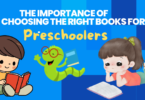

Leave a Comment